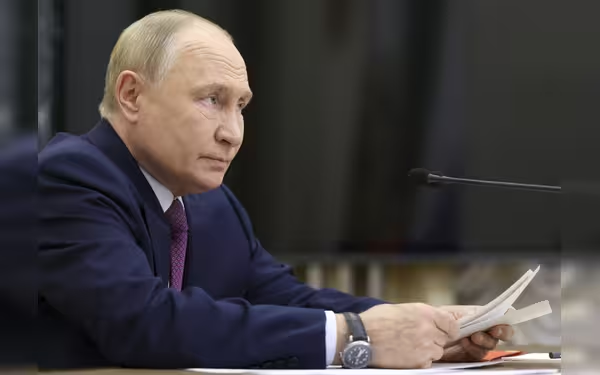Saturday, November 16, 2024 07:45 PM
Russia's Economic Resilience Against US Sanctions
- Sanctions on Russia lack expected effectiveness.
- Global cooperation is crucial for sanctions to succeed.
- Russia adapts to circumvent oil export price cap.
 Image Credits: arabnewspk
Image Credits: arabnewspkEconomists reveal that US sanctions on Russia are less effective than anticipated, highlighting the need for global cooperation.
In recent years, the geopolitical landscape has been significantly altered by Russia's invasion of Ukraine in February 2022. In response, the United States, under the Biden administration, has imposed a series of sanctions aimed at crippling the Russian economy. However, these sanctions have not had the expected impact, leading economists to analyze the effectiveness of such measures.
According to a new report by Oleg Itskhoki from Harvard University and Elina Ribakova from the Peterson Institute for International Economics, the sanctions imposed on Russia were not as effective as anticipated. The researchers argue that the sanctions should have been implemented more decisively and swiftly right after the invasion. They state, "In retrospect, it is evident that there was no reason not to have imposed all possible decisive measures against Russia from the outset once Russia launched the full-scale invasion in February 2022." This highlights a critical point: while sanctions are a tool for economic pressure, they are not a guaranteed solution.
The report emphasizes that Russia was able to prepare for these financial penalties due to lessons learned from previous sanctions imposed in 2014 after its annexation of Crimea. Furthermore, the effectiveness of the sanctions was diminished by the lack of participation from other major economies, such as China and India, which did not join in the sanctions effort.
Despite the high number of sanctions, the tangible impact on Russia's economy remains ambiguous. The researchers note, "While the count of sanctions is high, the tangible impact on Russia’s economy is less clear," indicating that mere numbers do not equate to effectiveness. They stress that global cooperation is essential for sanctions to work effectively.
The implications of this analysis extend beyond the Russia-Ukraine conflict. Sanctions have become a critical strategy for the United States and its allies to exert pressure on adversaries without resorting to military action. However, the limited impact of the sanctions on Russia raises questions about their future effectiveness in similar situations.
Since the onset of the invasion, the U.S. has sanctioned over 4,000 individuals and entities, targeting 80 percent of Russia's banking sector by assets. Yet, the Biden administration acknowledges that sanctions alone cannot halt Russia's military actions. To support Ukraine, the U.S. has also provided approximately $56 billion in military assistance. Many experts argue that the sanctions are insufficient, as evidenced by the resilience of the Russian economy.
Moreover, Russia has found ways to circumvent the $60 price cap on its oil exports, which was imposed by the U.S. and other G-7 nations. By creating its own fleet of older tankers that do not rely on Western services, Russia has managed to transport 90 percent of its oil, thus evading the cap. This situation illustrates the challenges faced by the U.S. and its allies in enforcing effective sanctions.
While sanctions are a vital tool in international relations, their effectiveness can be limited by various factors, including the adaptability of the targeted nation and the level of global cooperation. As the situation evolves, it is crucial for policymakers to reassess their strategies and consider more comprehensive approaches to ensure that sanctions achieve their intended goals. The ongoing conflict serves as a reminder that economic measures alone may not suffice in addressing complex geopolitical issues.













